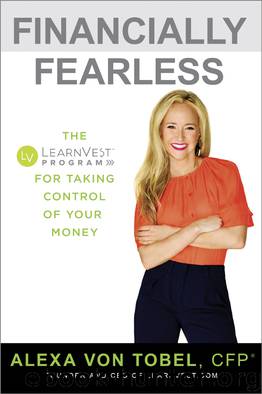Financially Fearless by Alexa Von Tobel

Author:Alexa Von Tobel [Tobel, Alexa Von]
Language: eng
Format: epub
ISBN: 978-0-385-34762-4
Publisher: Crown Publishing Group
Published: 2013-12-30T16:00:00+00:00
FEARLESS LESSON How Mortgages Are Structured
With a mortgage, you’ll pay the principal, interest, taxes, and insurance—all of which are commonly referred to as PITI. Note that paying taxes and insurance separately from your mortgage will mean a lower mortgage payment. Just remember that it’s up to you to save that money month to month so you can pay the annual bill when it comes! Banks largely prefer to collect the tax and insurance money in an account held by a third party (called escrow) because they pay only a little to maintain the account and have access to those funds. This is called “impounding” and is designed to protect you from having to pay a large property tax or insurance bill all at once. Here’s how each component works:
ESCROW. A bank account held by a third party to keep money safe before a deal is finalized or “closed”; also used for holding payments earmarked for annual expenses.
PRINCIPAL. The original amount that you borrowed to buy your home.
INTEREST. The amount of money you pay back to the bank on top of what you borrowed. When you take out a mortgage, you agree to an interest rate, which will determine how much you pay a lender to keep lending. It’s expressed as a percentage: 3 percent to 4 percent is considered somewhat standard as of 2013, but the rates depend strongly on a person’s situation—income and credit—as evaluated by the lender.
TAXES. Property taxes go toward supporting city, school district, county, and/or state infrastructure, and you can pay them along with your mortgage. They’re calculated as a percentage of your property value, so you can roughly estimate what you’ll pay by searching public records for the property taxes paid on nearby homes of similar value.
INSURANCE. Any payments reserved for homeowner’s insurance to protect against fire, theft, or other disasters are held in an escrow account. You also may be required to have private mortgage insurance (PMI), which helps guarantee that the lender will get its money back if you can’t pay it for any reason. After you’ve paid off a certain amount of your mortgage, you’re sometimes allowed to cancel the PMI (although this depends on your situation), or if the market appreciates quickly, you may be able to refinance so that you can eliminate the PMI. Remember that PMI is meant to protect the lender, not the borrower—so it won’t bail you out if you default on your payments.
Download
This site does not store any files on its server. We only index and link to content provided by other sites. Please contact the content providers to delete copyright contents if any and email us, we'll remove relevant links or contents immediately.
| Budgeting & Money Management | College & Education Costs |
| Credit Ratings & Repair | Retirement Planning |
The Compound Effect by Darren Hardy(7545)
Tools of Titans by Timothy Ferriss(6935)
Nudge - Improving Decisions about Health, Wealth, and Happiness by Thaler Sunstein(6629)
Win Bigly by Scott Adams(6306)
Pioneering Portfolio Management by David F. Swensen(5599)
Deep Work by Cal Newport(5452)
Principles: Life and Work by Ray Dalio(5315)
The Barefoot Investor by Scott Pape(5305)
Rich Dad Poor Dad by Robert T. Kiyosaki(5140)
Grit by Angela Duckworth(4728)
The Slight Edge by Jeff Olson(4716)
Discipline Equals Freedom by Jocko Willink(4631)
The Motivation Myth by Jeff Haden(4521)
Digital Minimalism by Cal Newport;(4511)
You Are a Badass at Making Money by Jen Sincero(4246)
The Four Tendencies by Gretchen Rubin(4017)
The Confidence Code by Katty Kay(3561)
Eat That Frog! by Brian Tracy(3506)
Captivate by Vanessa Van Edwards(3292)
